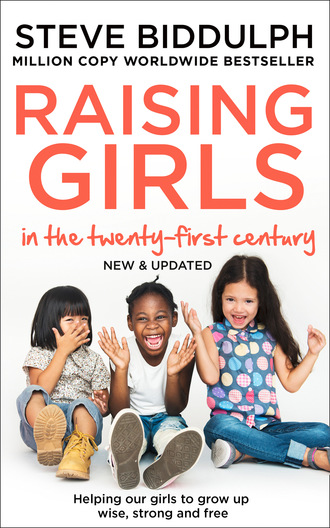
Полная версия
Raising Girls in the 21st Century
Often Lucy’s cries will be more intense, if something has scared her or she has a moment of painful hunger, or because something is not to her liking. Her mother will match this startle response with, ‘Oooh, what’s wrong?’ or, ‘Oh dear, what’s the matter?’ using the higher-pitched voice that adults tend to adopt around babies. This voice is more audible to a baby’s ears. (Though nobody knew that until recently audiologists learned how to measure it.) The mother will then shift her pitch and tone to a more soothing level. She will probably pick Lucy up and rock her gently to restore some rhythmic peace. From thousands of such soothings Lucy’s brain will learn the pathway from stress to relaxation, a pathway she can use for all her life to come.
Lucy and her parents’ time together will have a quality that is called ‘responsiveness’. Put simply, they will be tuned in to her and will get to know her ways. They will read her signals and respond, not in a panicky way, but smoothly and contentedly. Partly this is simply how love (and the hormone of love, known as oxytocin) works, but partly it’s because they have made it a priority to be not too busy or rushed in these early months. (They didn’t decide to renovate the bathroom or take a big promotion right now, knowing that babyhood was a pretty demanding event on its own.) Unless Lucy’s mum is numbed out by drug addiction, or is suffering from depression, she will most likely find Lucy delightful to be around, though certainly demanding. Parenthood may not come naturally, but it will grow and settle into a new and satisfying rhythm, if she gives it time and if she has support from those around her.
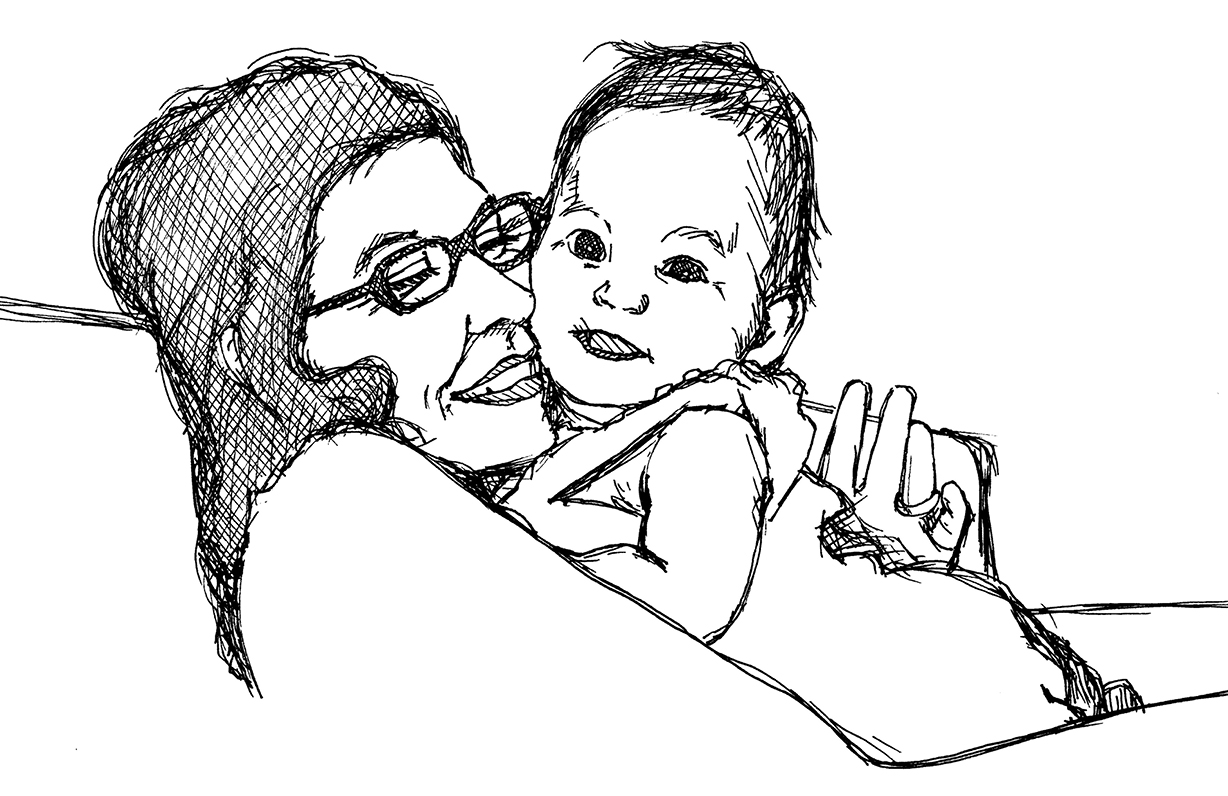
Support from grandmas, friends, aunties is very important. New mums or dads can’t easily do this stage on their own, they need a bit of mothering too. Love is like a river and it has to flow in and out of us. Being close to family and friends really helps when you have a little baby.
People Skills Start Very Young
As adults we know that people skills make a huge difference in life. We notice it most when they are not there – a hugely insensitive boss or colleague, a person in the street or a shop who is clueless and uncaring. Awareness of other people’s feelings, the timing of conversation, knowing when to listen and when to speak, are complex and advanced skills. Most of us have had moments with another person where we are awkward, where perhaps the timing gets jumbled up. Hopefully this is just momentary; often it’s when we are trying too hard, or wanting to impress. We lost our own ‘realness’. Some people we meet are extraordinarily engaged and sensitive and we feel great to be with them, noticed and valued. For a social animal like us, harmonious interaction is central to our happiness.
That’s why we start learning long before we can even speak. Interestingly, it’s the second six months of human life that seem to matter the most. This is the time when a baby gets much more fussy about who is around them. Mothers have known for thousands of years that a newborn can be shared around, but a six-month-old baby knows exactly who its mum and dad are, and often won’t trust anyone else.
Neuroscience bears this out. It’s in the second six months of life that the baby grows those areas of the brain that are specifically for people skills. Girl babies have more aptitude and awareness of social connection, which is a natural strength of girls, but this still must be nurtured and strengthened. It’s not a matter of being self-conscious or deliberate – that would actually get in the way – you just go with the flow. Your baby calls you, you respond. It’s casual, natural, and soothing for you both.
Growing the PFC
The first six months of little Lucy’s life are rather sleepy, as she just gets used to being out in the world. In the second six months things speed up. Just inside her little forehead is an area of the brain that, if you could see it, looks like a cauliflower, wrinkled and furrowed. This area, known as the prefrontal cortex, is now starting to grow. The PFC is the most complex part of the brain, and it governs some things that are very important for life. The prefrontal cortex is the seat of empathy, sociability and human contact. It’s what makes us human.
The prefrontal cortex couldn’t grow earlier, because it would have made Lucy’s head too big to be safely born. And what’s in there, the software, also needs to be programmed by Lucy’s parents or carers, because they are unique to her family and culture and will help her live with them for the many years it will take to raise her.
Along with its social functions, the prefrontal cortex also controls two important abilities:
1 The ability to focus, to pay attention.
2 The ability to calm yourself down.
Babies can’t calm themselves for one important reason: they are wired up for panic. In the wild (the way we used to live for a quarter of a million years) babies were carried about for most of the day, because that was the best way to keep them safe and give them good care. And often the adults were walking for much of the time, so it was just a practical necessity. (Even today, in the so-called undeveloped world, babies are rarely put down. They also rarely cry.) In our long pre-history there were plenty of predators about that would love to snatch a human baby for their dinner. So if a baby found herself alone or, worse still, a big hairy muzzle suddenly appeared in her face, dripping saliva – and it wasn’t dad – she was probably in trouble. Babies who cried loudly were more likely to be rescued fast. So fearfulness and noisy panic had a survival value that became part of our design.
This alarm system in babies left alone has a very important message for us as parents. For just as we are told right from birth to keep babies warm – since they can’t regulate their own temperature – we have to keep them calm because they can’t regulate their emotions. So dozens of times a day, a baby gets upset, whimpers or cries, and her mum, dad, grandparent or sibling picks her up, soothes her, and helps her relax. ‘It’s okay, everything’s fine, there, there.’ Gradually this soothing becomes part of her, she learns how to do it herself, but this takes several years of receiving the gift of calmness from others. It’s all gradually building into strong mental health for a lifetime.
The Gift of Calm
Your little girl learns calmness for life from the ease and comfort you bring to her early months and years. (Even in the womb, your adrenaline crosses over into her body, so a calm pregnancy can pay off in terms of giving you a more restful and happy baby.) This means planning as much as you possibly can to spend the time before and after your birth and right into the first year or two, with reduced pressure and the luxury of time with your little one.
This is so different to our idea of how to live: rush, hurry and busy-ness are the keystones of modern life. But our babies are Stone-Age babies, and modern madness does not serve them well. If you possibly can, make this time a break from the rush-about world you may have lived in all your life.
WHAT IS CALMNESS?
Calmness is not a character trait, it’s simply a skill. You have to decide that it matters, that the quality of your presence would be better if you slowed yourself down and were really connected to people and the moment you are living in. Then you practise until gradually it becomes part of you. It benefits everyone around you – they feel peaceful and happy in your presence. It’s exactly what children need in a parent. And it benefits you – with less stress hormones, you live longer and feel better. Calmness is well worth cultivating.
Calmness is made up of certain actions; breathing deeper, dropping your shoulders, settling your muscles, feeling your feet strongly planted on the ground, focusing your thoughts on the job in hand in a steady easy way, and not going off into panicked thoughts. Even just counting three or four breaths, in and out, will slow your heartbeat and calm your mind down. Calm people are actually doing these things automatically; when an emergency strikes they intentionally calm themselves more in order to counter the tendency to panic and do the wrong thing.
Self-regulating your level of emotional arousal is an incredibly valuable skill for life. All you have to do is notice, am I calm? If not, breathe a couple of times consciously, feel your feet on the ground, and notice how, as the last burst of adrenaline clears away, the calmness response starts to kick in. Practise this for a few days, and soon the natural appeal of calmness will pull you more and more to that peaceful and steady place. Everything is better – the taste of food, the scent of flowers, the feel of the water in your shower, warm on your skin. You will find that time slows down, and you can think more in the pause before you open your mouth. And that has real benefits!
Crying and Sleep
Feeling okay in the world is the first lesson you teach your baby girl. ‘You are loved and precious, I am here for you, and everything is okay’. A frightened or lonely baby won’t learn to calm herself if she is just left to cry – this is a common misunderstanding. She will go quiet eventually, but this is because of another survival pattern. ‘Nobody is going to come!’ A baby’s prolonged cries ‘in the wild’ might attract danger, so if her cries are not successful after a few minutes, the baby shuts down and becomes physiologically ‘depressed’. If parents are unresponsive – through suffering untreated postnatal depression, or being drunk or stoned, or just not caring – and if this happens often enough, the baby decides that ‘my efforts don’t have any effect on others’. This pattern will become part of how she responds to difficulty in life. It is called ‘learned helplessness’.2
It’s not a pattern you want your child to have, because she will lack a sense of mastery or hope in difficult situations. ‘Depression’ is often misunderstood – it is simply an ability of the human body to shut down, from ancient times when we had to sit out bad weather or endure long winters of cold and dark. At such times, with little food about and no energy to catch it, moving little, eating little and doing little was the best way to survive. But the depression response can easily become overdeveloped. Teaching depression to a child by ignoring her is not going to help her. She may lie still, but she is actually very unhappy.
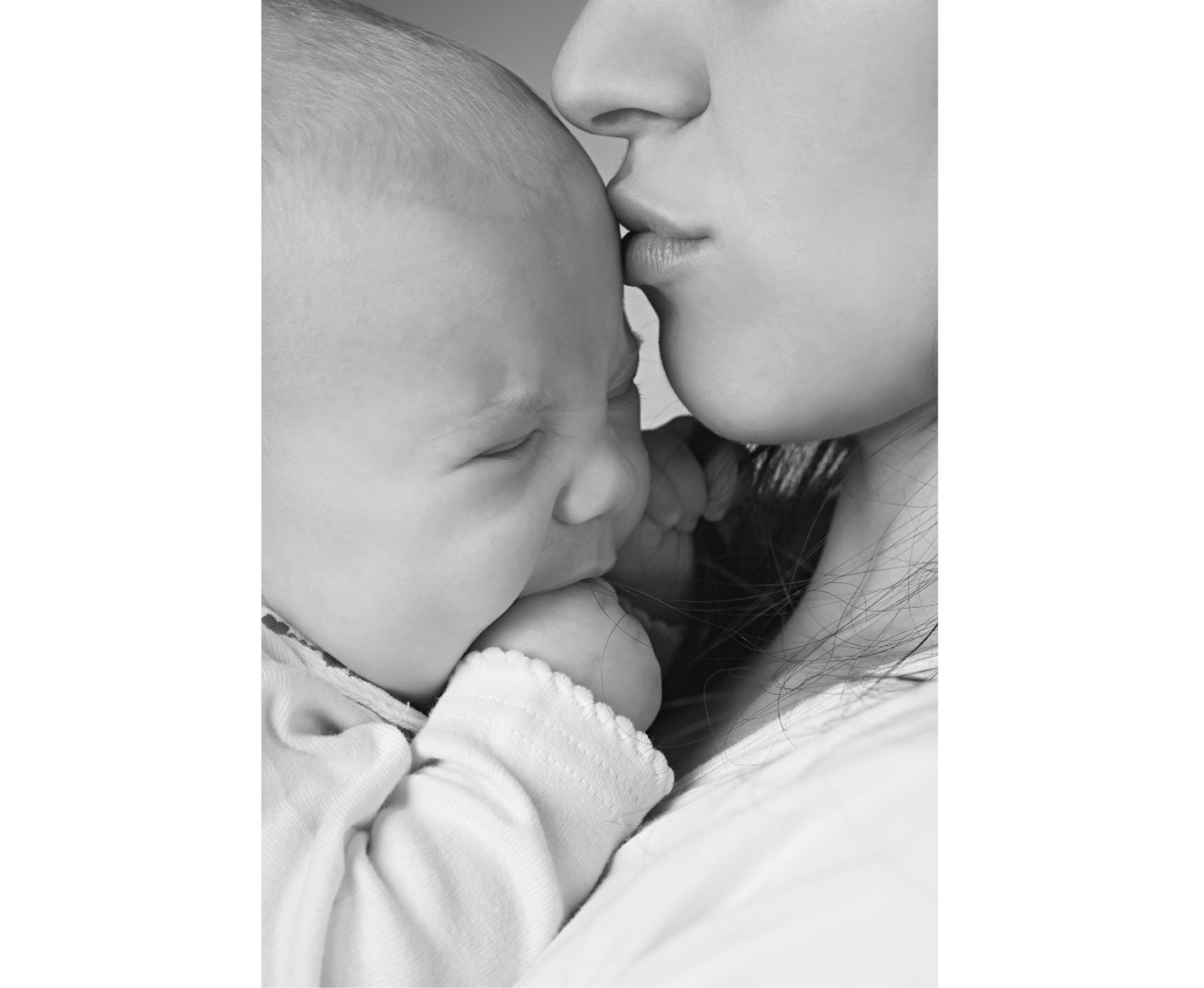
© Pavels Rumme/Shutterstock
There is a middle road here; especially when getting babies to sleep, which can be an important part of parents’ survival. Sometimes a baby in her cot will make sounds, trying to bring the adults to play with her after she’s been put to bed. It’s fine to let her whinge and whine a little as part of her giving up on ‘game time’ and letting sleep take over (especially when mum or dad is totally knackered and just needs a rest), but if the whingeing turns into full-voiced distress, that’s not good. She needs calming and settling. The caring bond between you is endangered, and she needs to know you are there. (In the notes you will find some good reading suggestions on how to get more sleep for your baby, and for you, without using harsh methods to do so.)
You Also Have to Excite Your Baby!
After all this talk about calmness, it’s important to remember the opposite message too: we don’t always want our babies calm. Babies and toddlers also need to learn to go into higher states of excitement, to increase their emotional range and enjoyment. From time immemorial, parents and siblings will just naturally tickle, tease, excite and stimulate babies. Your little girl will giggle and ‘come alive’ when you energise her in whatever way works for you – singing to her, playing peek-a-boo by hiding your face behind your hand or a magazine and popping out again. Tickles, cuddles and dancing about with her in your arms will help her coordination and body sense, but don’t do it for that reason, do it for the fun of it. Put some music on, and let yourself go!
Even the rough and tumble play that dads do with small children helps this along. Dads are notoriously prone to exciting kids by tossing them about, chasing and wrestling and swinging them around. Your daughter may get a little stressed by this, but if it is done in the right way (which you can tell by watching her face for signs of real distress, and backing off a little) she will get over it and start to giggle. Research has found that little girls who play with their dads when they are toddlers are much more stress-proof than those who had it all too safe and gentle!3
(A cautionary note, especially for dads, when a baby is little, be careful with their necks – and their body generally. A baby cannot support the weight of their head with their little neck for many months and it may flex to the point of injury or sprain. Always support their head and neck firmly as you move them about.)
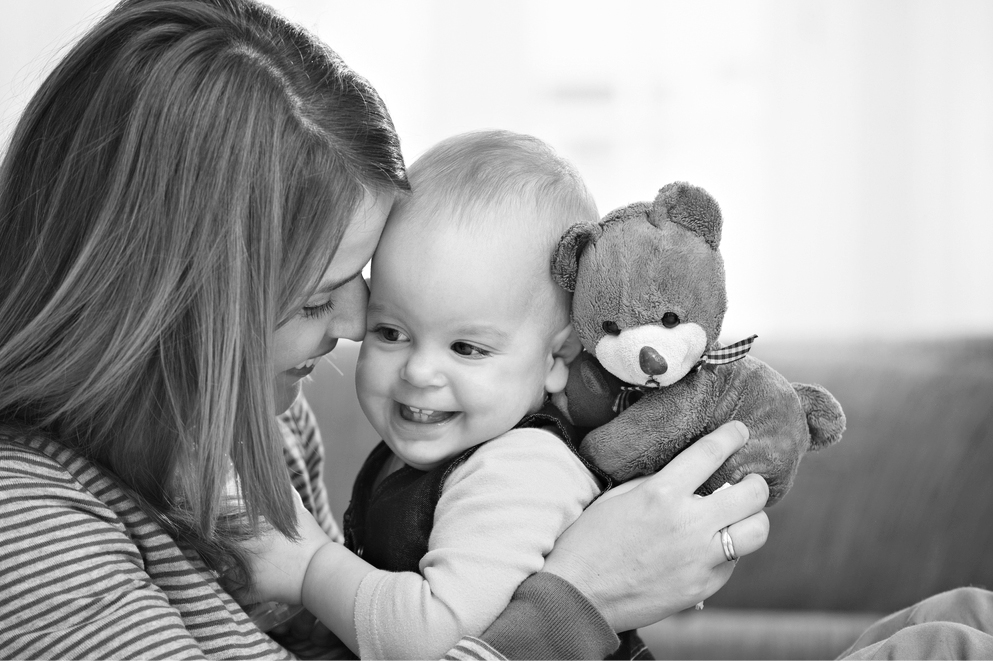
© Stocklite/Shutterstock
There is something else even more important: setting an example of fun. Your daughter learns most by watching you. If you are happy, exuberant, silly and fun with her at those times that it is appropriate (i.e. not when driving the car), then her capacity for being happy will grow. If you are friendly to people you meet, enjoy getting your clothes on, sing while you shower, are kind to people in shops or in the street, speak well of people, get cross when you see something unjust or wrong, then your daughter will be taking in and making these attitudes her own, from a surprisingly young age.
It’s worth checking up on this – especially for mums, who are the number one role model for their daughter’s whole approach to life. Spend a day having a close look at yourself; do you frown, stress, grump and hurry your way through life? If that is so, being the mother of a newborn little girl might make you want to change that.
THE HORMONES OF LOVE
Many of us today feel unprepared for parenthood. A hundred years ago, most families had seven or eight children and their homes were noisy and crowded places, but often very happy ones. Everyone grew up with babies and toddlers around them and knew how to handle them. Today it’s very different. One study found that one-third of new parents have never held a baby before they get their own!
Luckily our hormones help with this inexperience. New mothers’ bodies flood with a hormone called prolactin. If you are lucky and can breastfeed your baby, then prolactin goes much higher in your bloodstream and makes you feel dreamy and slowed down. It helps you to focus and be there for your child. Other hormones help too; when you hug your baby, or your partner or a friend hugs you, the hormone oxytocin (the love hormone) makes you feel contented and settled.
Oxytocin is a remarkable hormone; it is released when we have an orgasm, it is released when we greet a friend, and when we eat food with someone, sitting together at a table, it increases in our bloodstream. At birth, if it’s a relaxed environment and we feel safe, it floods into us. You need all the oxytocin you can get! When people talk about bonding, it’s oxytocin at work. People who did not get enough love, and therefore enough oxytocin, often can be found seeking that satisfaction in other ways – through fame, doing drugs, compulsive sex, shopping, stuffing our face with unhealthy food. Or writing books!
Gabor Mate, famous for his work with drug addicts on Vancouver’s East Side, says that heroin, and the rush of wellbeing as the injected drug surges into your bloodstream, is a substitute, a mimic, of being loved – but with a much different result.
It’s all an attempt to get that oxytocin we didn’t get in our mother’s arms. So giving your baby lots of affection is a great liberator. It makes her strong and independent, and a people person who will love and be loved for the whole of her life.
HOW TO PLAY WITH A BABY
With your baby daughter, even from the very first weeks, playfulness can be at the heart of everything you do. This playful mood delights her, but it also makes ordinary tasks so much easier if she sees them as fun.
For instance, babies have to be bathed. Some parents just hurry through this briskly, but most mums and dads can’t resist the urge to make it a pleasure for their baby and themselves. They make sure the room is warm; they aren’t fussed about a bit of splashing; they swish the water around their baby, singing or chatting and making noises and, most, pleasurable of all, lift scoopfuls of water and pour it down her back or front, which she just loves. Many of us can still remember this from our childhood, the delight of warm soapy water on our skin, and a kindly person patting us dry with a soft towel.
At six months of age, when she can sit up, your daughter will tip water herself, squeeze a trickle from the washer, and pop soap bubbles. Bathtime can be a wonderland for her senses.
Even getting dressed, or having a nappy changed, goes better if done in a playful mood. Your daughter will fuss less because she associates this as a happy time. She will take all her cues from you; if you are stressed, she will fuss, because she is worried about you. If you are happy, she will be too.
When you play with a child you are starting something big. Child-development experts are now convinced that playing is what brings out our brain’s full potential.4 Play unleashes lifelong creativity. The greatest discoveries have been made by playful minds being inventive and different.
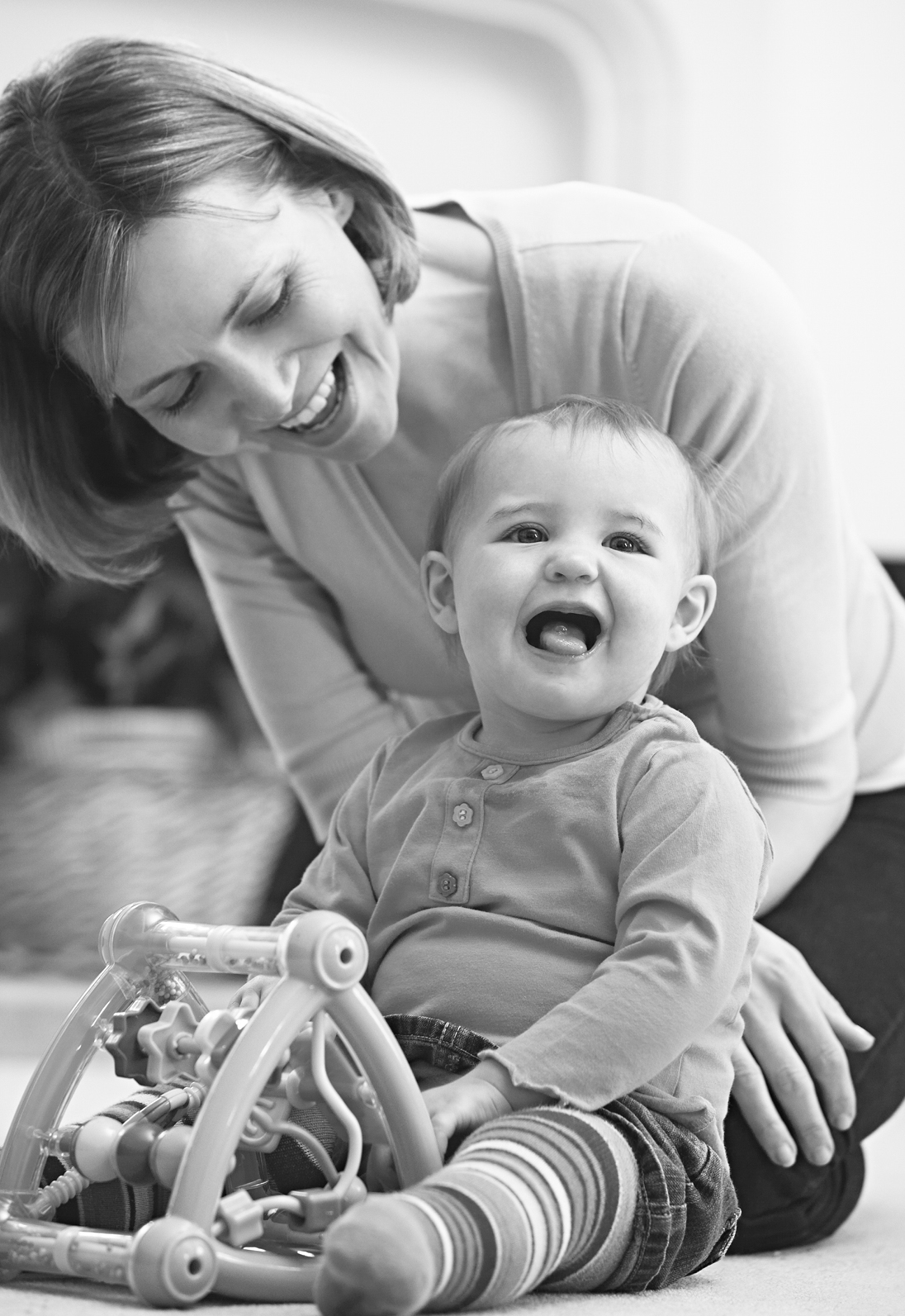
© Monkey Business Images/Shutterstock
A girl raised with a sense of fun will not be shy or dull, she will ‘think outside the box’ and bring this ability to whatever career she chooses. She will be able to get along with others in a happy way, because play is all about collaboration. Playfulness makes you confident and light-hearted, willing to try new things, it dispels stress and boosts your immune system. It makes you more active, which then promotes fitness and health.
If you aren’t a naturally playful person, just have a go! Play is as infectious as a baby’s laugh. You will soon find your daughter’s delight and natural capacity for fun captivates you and you both have a ball.
OUR BABY WILL FIT RIGHT IN (LOL!)
Have you ever talked with a young couple who don’t have kids, but plan to?
Often couples in that first flush of confident planning, especially those who are very success driven, will proceed into parenthood full of goals and high aspirations. ‘We will never …’, and ‘our child will …’. There’s a lot of ‘will’ and ‘won’t’ in their vocabulary, because before you have children, life actually sometimes responds to your intentions. You still have the illusion of control – something that real parents have long abandoned!
When talking to parents-to-be, it’s important never to disillusion them (you should never discourage the young!). A common claim of the not-yet-but-soon-to-be-childed is that ‘our baby will fit in with our lifestyle’. ‘If it learns to fit in right from the start, it will be that way all along.’ Experienced parents listen to these plans and do their best to contain their mirth.
I had some friends who were talking this way. They were both nurses and had put off starting a family, then when it came time to make babies, it took a while for it to happen. Finally they had their baby, and I didn’t hear from them for a while.
At the time I belonged to a trauma team, helping emergency service workers after especially stressful incidents. This work sometimes happened very late at night. One night driving home through Hobart at about 2 am, I saw a strange hunchbacked figure, shambling along the waterfront near Salamanca. There was a large lump on its shoulder, and it was clutching it and walking unevenly but resolutely along the deserted street. I have an active imagination, and I immediately thought – ‘It lives beneath the wharf! Creeping out at night to feast on pizza crusts, shunning the human gaze’. But as I drew closer, I recognised my friend! The hump on his shoulder was a baby. He was walking the streets with his baby at 2 am! He saw me and gave me two fingers and a grin – and I pulled over to see if he was okay. He just laughed as he read my thoughts: ‘This baby is fitting in with our lifestyle!’ He was walking the baby to get it to sleep, it was the only thing that worked.
Take it from me, babies do not fit in with your life. Babies take the Kleenex of your life and roll it into a snotty ball! If you do parenthood even half well, it will re-arrange your world. Babies do this in one especially important way (I’m not sure whether to whisper this or shout it, but here goes): You won’t come first in your own life for at least 20 years. If you’ve spent 20 or 30 years being a self-centred so-and-so, you will find parenthood extremely challenging. But it will be good for you. Hopefully parenthood, and your child, will reward you with enough love that you won’t mind this, but it’s important to know what you are in for.
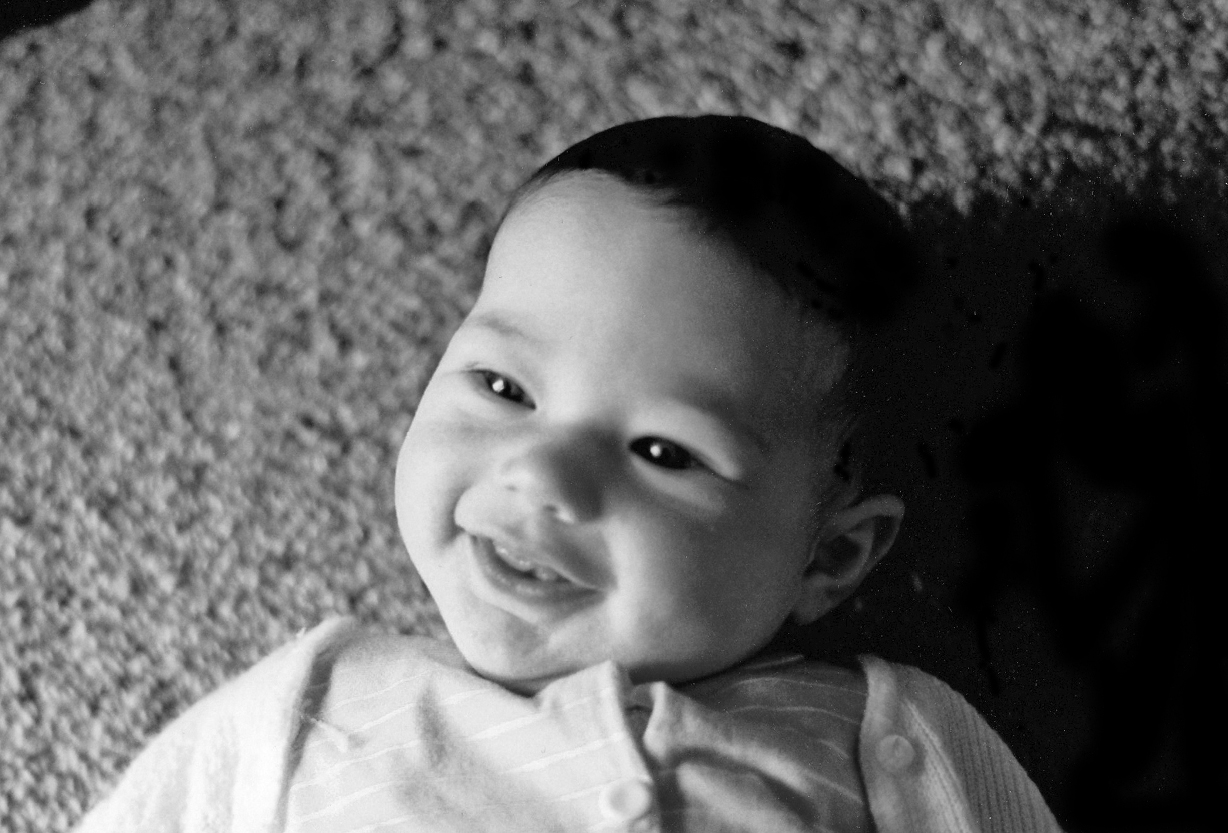
(In our family this was definitely how it was. As mentioned earlier, we planned carefully for homebirths with great midwives and doctors on standby, and both times we had emergency caesareans. But you claw back what you can – I was there both times, trying not to faint, and I held our babies the second they emerged from behind the green sheets. A few hours after my son was born, I faced down a monster nurse who wanted to put a two-foot plastic tube into his stomach for a sample ‘just in case’. Our babies slept with me on the floor of the hospital room so that they were near their mum as she recovered from her operation. So I am not saying give up your ideals, but give up your well-planned perfect life, and learn to be flexible!)
Parenthood is so worth it, and so difficult, at the same time. Say goodbye to self-absorption. You never needed it anyway. It didn’t look good on you.
DON’T EDUCATE – JUST ENJOY
In recent years there has been an avalanche of products and programmes – DVDs, flashcards, books and expensive courses – to take advantage of parents’ anxiety to have a smarter child. Despite all this effort and expense, with babies being urged to read at two or play the cello at four, there is absolutely no evidence that these approaches have any benefit at all. In fact, such educative efforts may have real costs in making parents and child more anxious and their relationship more strained. It’s tempting to say that any product or place with the words ‘Early Learning’ in its title should be avoided at all costs. I’m not saying that, but it’s tempting!
Of course babies and toddlers love stimulation, but it’s how we go about it that matters. Studies of vocabulary acquisition (learning and using lots of words) have found something very interesting: kids do not get a larger vocabulary from being hammered with stimulating words and ideas. Researchers have found that the toddlers with the most words in their repertoire are the ones whose parents listen to them the most. It’s not hearing lots of words, but using and enjoying them that fixes them in your child’s memory. Children remember words when they experience the power of words to interest and engage others. ‘Give me the teddy, Daddy’ (Father uses the teddy to tickle his daughter, making her giggle). ‘No, Daddy, give me the teddy SLOWLY.’

